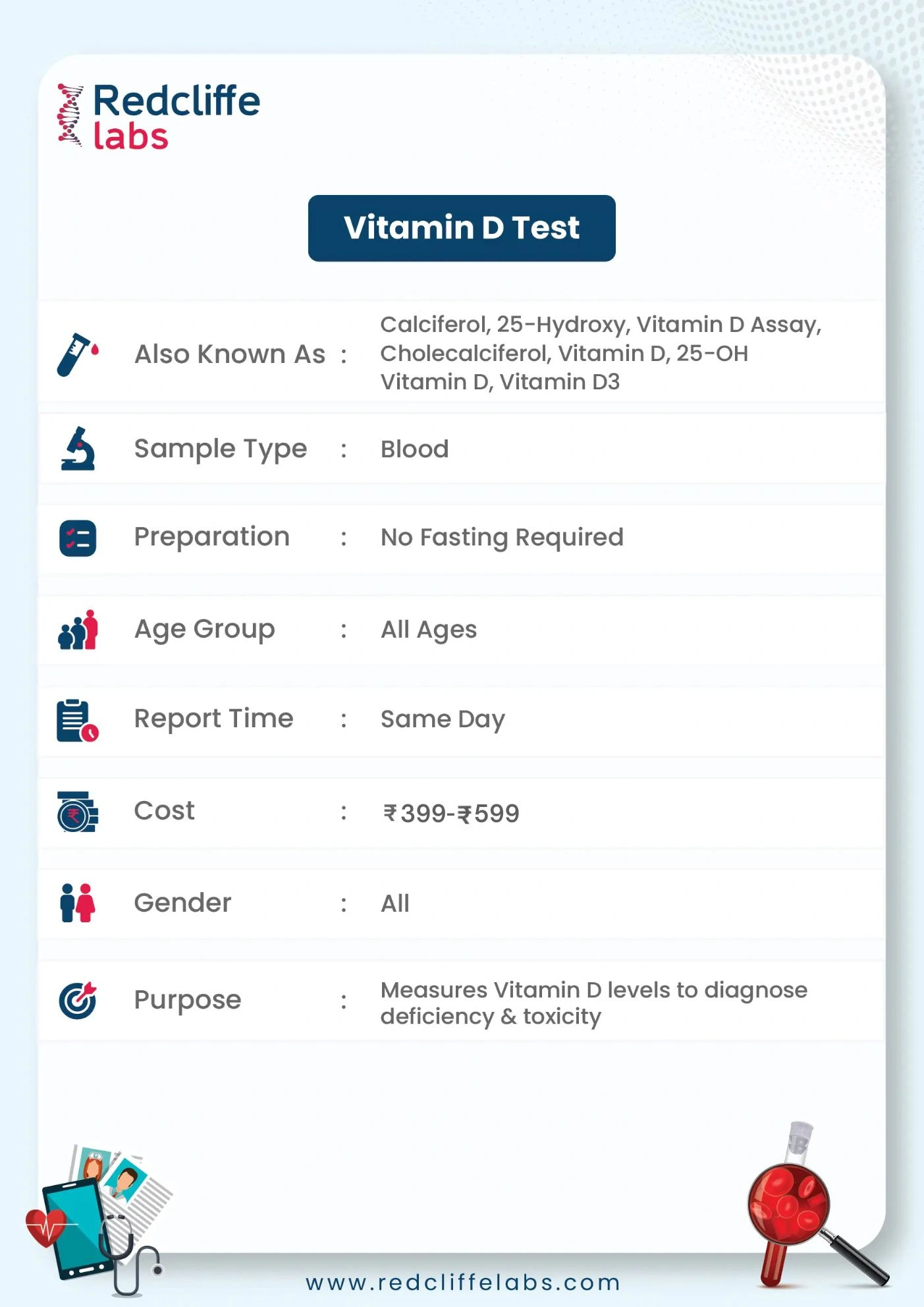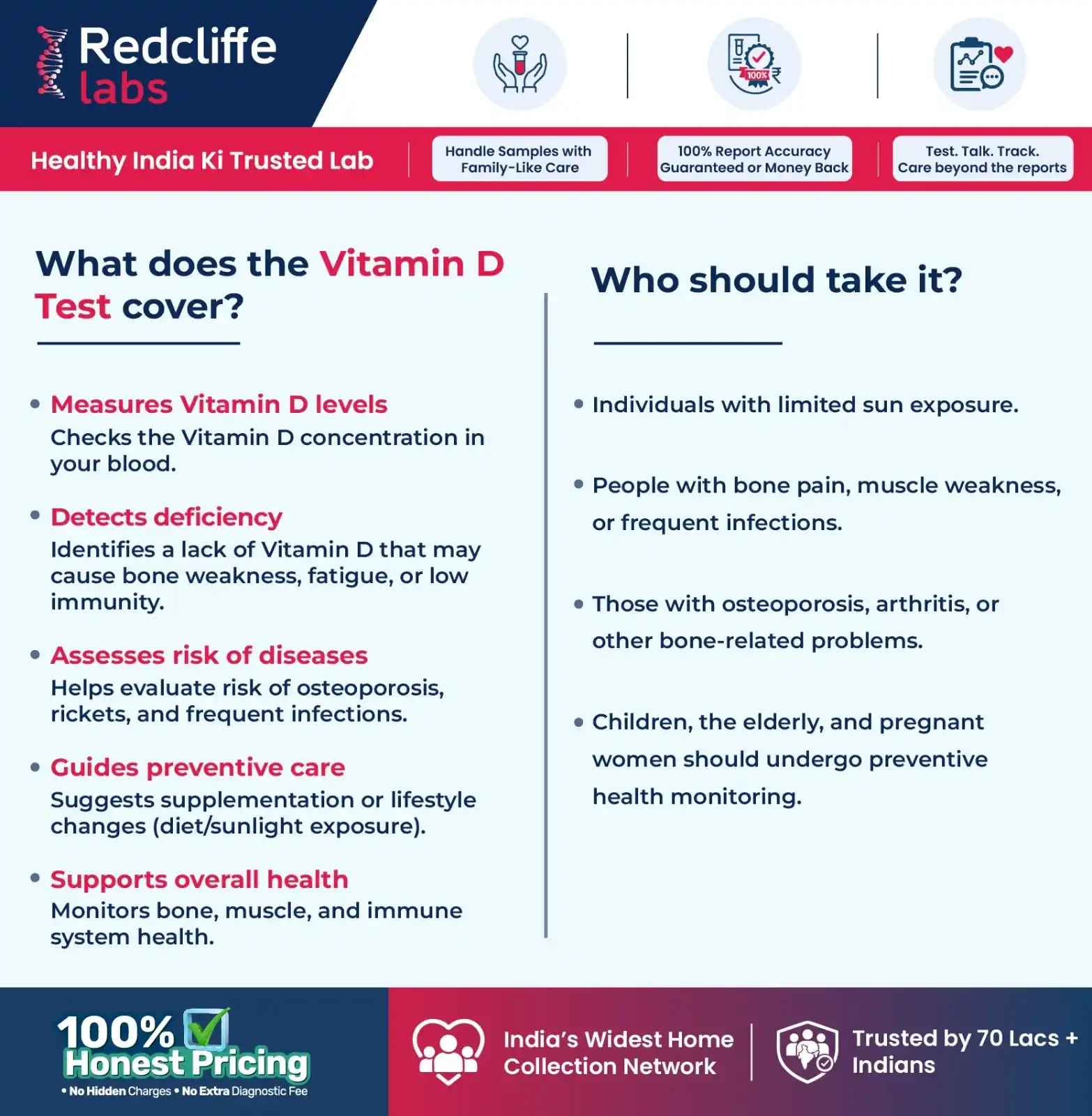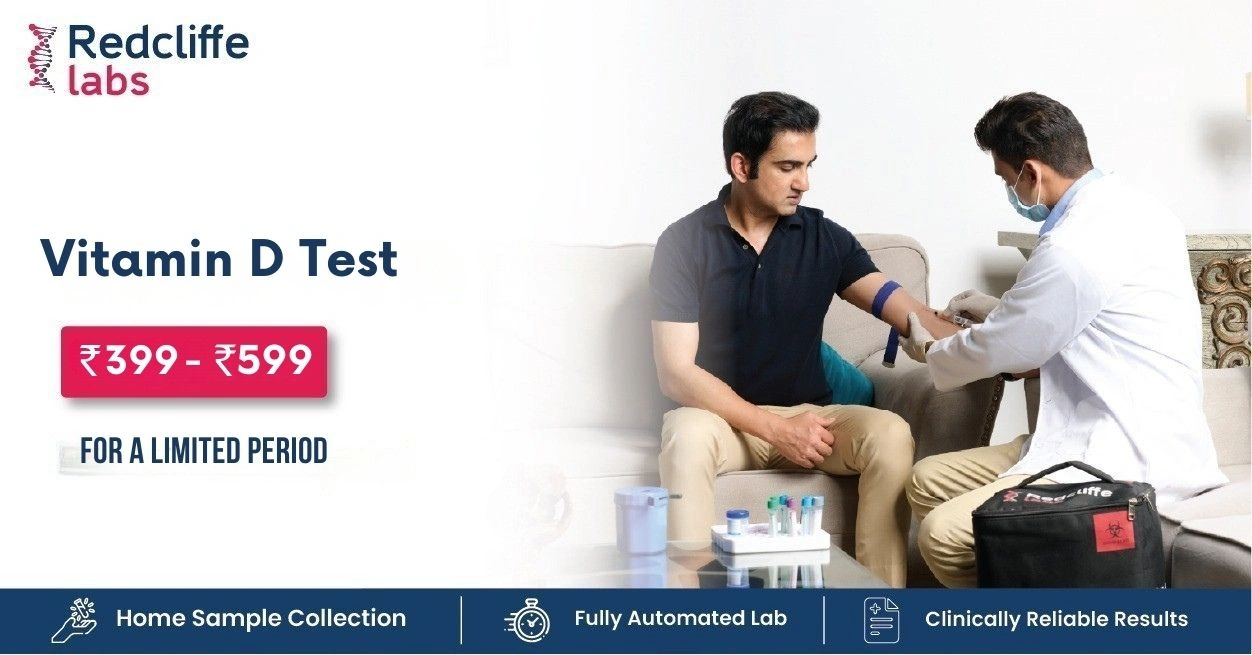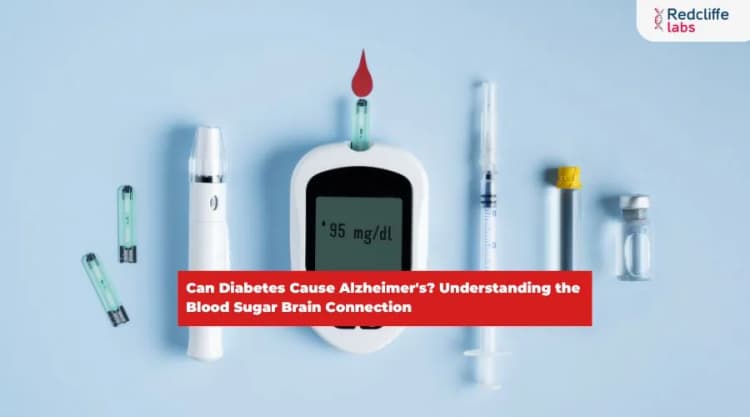This test measures 25-hydroxyvitamin D, the primary ...Read more
Blood
Unlock special
discount on
this package
Login to Unlock 🔓
Also Known As
Calcidiol 25-hydroxy, Cholecalciferol test, 25-OH Vitamin D Test, 25-Hydroxy, Vitamin D Assay, Vitamin D3test Instructions
NABL Accredited lab*

Booking Benefits Unlocked Worth FREE 799

Report Consultation

Diet Plan
*Available once your report is generated.
At Redcliffe Labs, we have a single goal: to give India its right to quality diagnostics.
Customers served
Tests Processed Everyday
Cities
Collection Centres
World Class In-house Labs
Home Collection Experts
1 Test Parameters
Vitamin D 25 Hydroxy
1 PARAMETER INCLUDED
1 PARAMETER INCLUDED
- Vitamin D Total-25 Hydroxy
Helps you know your test better
Who all are eligible for the Vitamin d test?
- Symptoms of Deficiency: Individuals experiencing symptoms of vitamin D deficiency, such as fatigue, muscle weakness, bone pain, or frequent infections, may be eligible for testing.
- Certain Health Conditions: People with certain medical conditions that may affect vitamin D absorption or metabolism, such as osteoporosis, malabsorption disorders, kidney disease, or liver disease, may be eligible.
- Pre-menopausal women, people above the age of 60, people with minimum sun exposure.
- People who do not get enough vitamin D in their diet.
- Medication Use: Certain medications, like anticonvulsants, glucocorticoids, and weight-loss medications, can affect vitamin D metabolism. People taking these medications may be eligible for testing.
Why take Vitamin D test ?
- This test is important because vitamin D is important for bone health for everyone.
- Prolonged vitamin D deficiency may cause rickets in children and osteomalacia in young adults.
- The test is useful in finding bone disorders in all age groups.
- On the basis of the analysis of this test, doctors may advise making some lifestyle modifications, such as stopping smoking and alcohol consumption, improving physical activity level, increasing sun exposure time, etc., to prevent common health issues.
What are the benefits of this test?
- The finding of this test helps in many ways:
- It will promote healthy muscles, bones, and teeth.
- It will support diabetes management and heart health.
- Regular assessment will prevent future disabilities due to a lack of vitamin D in the body.
- This test also helps to assess the amount of phosphorus and calcium in the body.
- Influencing the expression of genes involved in cancer development.
Top Booked Health Checkup Packages
Reports in 12 hours
|Parameters 94
Reports in 12 hours
|Parameters 89
Reports in 12 hours
|Parameters 96
Reports in 12 hours
|Parameters 96
Reports in 12 hours
|Parameters 90
Helps you know your test better
Q. How can I book my test?
Q. In how much time will I get my test report?
Q. Where can I see or get my test results?
Q. Is home sample collection available for Vitamin D test?
Verified by Medical Expert

WRITTEN BY
Sheena Mehta

MEDICALLY REVIEWED BY
Dr. Pradeep Lodha
Table of Content
Introduction to Vitamin D Test
Are you feeling sun-deprived lately? Don’t you get enough sun required to meet your Vitamin D needs? Well, you might not be the only one! In today’s lifestyle, where adults are stuck in 9-5 jobs, youngsters are into their smartphones, and kids prefer playing indoors to going outdoors, many of us are missing out on one crucial essential nutrient, Vitamin D, which our body requires for most purposes. From uplifting mood and boosting immunity to supporting bone health, Vitamin D, aka sunshine vitamin, contributes to overall wellness in one or more ways. Doctors often suggest a Vitamin D Test to identify deficiency or toxicity and suggest correct preventive measures. The Vitamin D Test diagnose deficiency or toxicity by measuring the Vitamin D levels in the blood and also helps monitor the treatment for already known conditions.
If you want to book a Vitamin D Test, Redcliffe Labs is a new-age diagnostic service provider that you can count on. We push our limits beyond conventional boundaries and keep our front foot forward to ensure our clients will have the best diagnostic experience from the comfort of their homes within budget.
Vitamin D Test Details In Brief:
| Also Known As | Calciferol, 25-Hydroxy, Vitamin D Assay, Cholecalciferol, Vitamin D, 25-OH Vitamin D, Vitamin D3 |
| Purpose | Measures Vitamin D levels to diagnose deficiency & toxicity |
| Preparation | Do not take any over-the-counter medicine without confirming with your doctor |
| Fasting | No Fasting Required |
| Get Reports Within | Same Day |
| Vitamin D Test Price | Rs 499 |

What is the Vitamin D Test?
Vitamin D is crucial for your overall health. Its deficiency can cause several health complications. A vitamin D test helps determine the vitamin D level in your blood. It can check your body’s functioning.
Vitamin D deficiency may lead to bone disorders and other medical issues. With timely testing, you can determine your level and take preventive measures accordingly. The vitamin D test is popular under several names, such as 25-hydroxyvitamin D, 25(OH)D, cholecalciferol test, vitamin D2 test, calcidiol test, vitamin D3 test, and ergocalciferol test.
The price of a vitamin D test varies from lab to lab. Depending on the current scenario, it can go as high as INR 3500. To make it affordable, Redcliffe Labs offers the test ranges from Rs 449 - Rs 599, and it comes with a home sample collection service.
What is the Purpose of Vitamin D Test?

The sole purpose of the vitamin D test is to detect low levels of vitamin D in the blood. This deficiency can cause calcium deficiency, leading to bone disorders. A vitamin D test can monitor the cause of low vitamin D levels.
It can also help rule out health issues like rickets, low bone density, and osteomalacia, a medical condition linked to muscle weakness. Vitamin D is crucial for all body parts, and with early detection through a vitamin D test, it can detect any underlying or long-term chronic health issue.
What Does The Vitamin D Test Measure?
The vitamin D test measures the amount of vitamin D in your blood. However, it also helps measure other substances.
- The test can measure your body’s ability to absorb minerals like magnesium, calcium, and phosphorus.
- The test can measure and maintain your bone health.
- The test can measure the reason for muscle and bone weakness, leading to abnormal bone development.
Vitamin D test measures substances known as vitamin D2, D3, 25-hydroxyvitamin D, and 1,25-dihydroxyvitamin D. Vitamin D2 and D3 are chemical changes that update kidney and liver functioning.
What Are The Symptoms That Call For A Vitamin D Test?
Our body provides varied signs when our vitamin D levels are not balanced. Some of the common symptoms that could be indicative of Vitamin D deficiency or toxicity include:
- If you are feeling constant fatigue, exhaustion, or weakness, despite getting enough rest, it could be a sign that something is not right with your health.
- If experiencing muscle weakness, bone pain, or tenderness in the bones, often in the back, hips, or legs, you may need a Vitamin D levels test.
- Moreover, Vitamin D deficiency contributes to pain or stiffness in the joints.
- Unusual mood swings indicate that your vitamin D levels might not be balanced.
- Excessive hair loss or thinning of hair is another sign that you may need to check your Vitamin D levels.
- If your wounds take forever to heal, your doctor may suggest a Vitamin D test to check the cause.
- Higher susceptibility to infections or frequent infections is another sign that your Vitamin levels might be disturbed and needs to be analyzed for accurate diagnosis.
- Frequent or unexplained bone fractures, especially in older adults, could be a sign of Vitamin D deficiency.

Understanding that there could be other reasons for these symptoms is critical. Therefore, getting tested, as suggested by your healthcare practitioner, is crucial to determine the cause and take appropriate measures while there is still time. You can schedule a Vitamin D blood test at home with Redcliffe Labs to assess the status of your Vitamin D levels comfortably from home.
Who Needs The Vitamin D Test?
You must take the vitamin D test if you see symptoms like bone weakness. However, certain people are at risk of vitamin D deficiency and must take the test.
- People older than 65.
- People with less exposure to sunlight.
- People with dark skin.
- People who are obese.
- People who have a health condition like Crohn’s disease, celiac disease, and ulcerative colitis.
- People with liver and kidney disease.
- People who have undergone weight loss surgery.
- People who take medicines that can affect their vitamin D levels.
- People with low vitamin D diets.
- People who live in darker or less sunlight areas.
- People with osteoporosis. Osteoporosis is a health issue that makes bones weak enough to break, leading to fractures.
Causes of Vitamin D Deficiency
The sun is the ultimate source of vitamin D, but people are deficient in it. Numerous reasons lead to vitamin D deficiency. If you have any of the causes listed below, you must take the vitamin D test.
- Less Exposure to Sunlight- People living in darker areas or spending most of their day under a roof (house) are at risk of vitamin D deficiency. This mostly includes corporate people.
- Weight loss—Weight loss surgeries make it difficult for the body to consume and store nutrients like vitamins, minerals, and carbohydrates. This leads to vitamin D deficiency.
- Age- Your age determines your body’s ability to absorb vitamin D. As you age, your body’s ability to absorb vitamin D decreases.
- Skin Color—Experts observed that people with darker skin have a lower ability to absorb sunlight, which is important for the skin to produce vitamin D.
- Certain Medicines—Medicines such as steroids, seizure control drugs, blood pressure medicines, cholesterol-lowering drugs, and laxatives majorly reduce vitamin D in the body.
- Medical Condition-Crohn’s, celiac, and cystic fibrosis are some diseases that limit your intestine from absorbing vitamin D through supplements.
- Obesity and Breastfeeding—Obesity occurs when fat cells increase. These fat cells keep vitamin D isolated. On the other hand, during breastfeeding, infants or babies mostly absorb vitamin D, leading to vitamin D deficiency.
Risk and Complications of Vitamin D Deficiency
Vitamin D deficiency leads to low calcium, which directly impacts bone health and health complications like bone disorders. Vitamin D deficiency can cause the following health complications:
- Hypocalcemia (low calcium level in the blood)
- Hypophosphatemia (low phosphate level in the blood)
- Rickets (bone softening leading to fracture in children)
- Osteomalacia (bone softening in adults)
These complications are treatable with proper vitamin D intake, supplements, and timely testing. A vitamin D test can help in the early detection of vitamin D deficiency and prevent the risks of health complications. One should treat rickets as early as possible, as severe can lead to bone damage, seizures, and heart damage.
What Are Some Reasons Your Doctor May Suggest Vitamin D Test?
Apart from the obvious reason that one has symptoms indicating Vitamin D deficiency or Vitamin D toxicity, your doctor may suggest Vitamin D3 Test in the following scenarios, including:
- Certain Medical Conditions: If you have a certain underlying medical condition that affects the body’s ability to absorb or utilize Vitamin D and indicates Vitamin D deficiency or toxicity, your doctor may suggest you get tested to confirm or rule out the cause. Some common conditions doctors recommend getting tested to assess vitamin D levels include malabsorption disorders, liver/kidney diseases, certain autoimmune conditions, etc.
- Have Risk Factors: In addition, Vitamin D Deficiency Test or Vitamin D Toxicity Test is recommended to most individuals leading a vegetarian or vegan diet, are older or obese, have limited sun exposure, and are a high-risk factor category.
- Evaluate Bone Health: Vitamin D is undeniably the most important factor in improving bone health by helping with calcium absorption. Therefore, individuals with osteoporosis, osteopenia (low bone density), or other diseases indicating poor bone health may be suggested for a Vitamin D Level Test.
- Routine Checkup: In some cases, your healthcare provider may suggest a Vitamin D 25 Hydroxy Test as part of a routine health checkup to assess overall Vitamin D level status.
It is critical to understand that your healthcare practitioner may consider varied factors, like symptoms, medical history, family history, and risk factors, before a Vitamin D Lab Test to check the status.
What are the Benefits Of Taking Vitamin D Test?
- Assess Vitamin D Levels: The Vitamin D Test helps determine the status of Vitamin D levels to accurately identify whether one has deficiency or toxicity in the body.
- Monitor Treatment Progress: Individuals receiving treatment for Vitamin D deficiency or Vitamin D toxicity to monitor the response to the treatment. It helps doctors assess if the treatment is working fine or adjustment in the dosage is required.
- Allow One To Moderate Their Lifestyle: Routine Vitamin D screening helps one understand the problem and take necessary preventive measures to control the condition and prevent complications.
Your doctor may use the Vitamin D Test with other tests to assess your overall health & provide appropriate adjustments based on your circumstances. Therefore, it is essential to consult your doctor about the type of test required, depending on your condition.
Tips To Balance Vitamin D Levels:
Increasing vitamin D levels is crucial for taking control of your condition, preventing complications, and maintaining optimal health. Here are some powerful tips for maintaining healthy Vitamin D levels:
- Sun Exposure: Being a natural source of vitamin D, sunlight is essential for ensuring your good health in many ways. Sit in the sun for 15-30 minutes, 3-4 times a week. Expose your arm, legs, or face to the sun before 11 AM.
However, while being exposed to the sun, it is essential to follow healthy & sun-safety practices. Failing to follow safety measures before exposing yourself to sunlight can lead to sunburn or other health problems.
- Follow your doctor's advice: If you are diagnosed with a deficiency, your healthcare provider may prescribe high-dose vitamin D supplements (e.g., 60,000 IU once a week for 6–8 weeks). Regular monitoring may also be prescribed every 3-6 months.
- Combine vitamin D with healthy fats: Vitamin D is fat-soluble, so eating it with healthy fats like olive oil, nuts, or avocados improves absorption.
- Change Your Diet: If you are a vegetarian or a vegan, you are at more risk of developing Vitamin D deficiency than a non-vegetarian. Routine checkups are essential. Non-vegetarian foods offer more Vitamin D.
Being a vegetarian, you can consume dairy, eggs, cow's milk, and some fortified foods like fortified oats and cereals, fortified curd/yogurt, and fortified orange juice.
The best vegan options include UV-exposed mushrooms, as well as fortified plant-based milks such as soy milk, almond milk, oat milk, and coconut milk. Additionally, as a vegan, you can rely on fortified cereals and oats, as well as fortified juices, to help bring balance and improve your wellness.
- Balance Other Nutrients: Having the right balance in life is essential, especially regarding your dietary choices. Therefore, it is always suggested to have an adequate amount of all nutrients to support better Vitamin D levels and optimize its absorption & utilization in the body.
Nonetheless, your healthcare provider may suggest supplements, especially if you have limited sun exposure, are pregnant, breastfeeding, or elderly, and have symptoms of deficiency.
Preparations Required For Vitamin D Test:
Being a simple blood test, it requires no special preparations. However, a few guidelines that one must follow, include:
- Dietary Recommendations: The Vitamin D Test doesn’t require fasting, and you can eat or drink water before the test. However, in some cases, you may be asked to avoid certain food items or heavy meals, depending on varied factors. Therefore, it is critical to follow their instructions.
- Inform Your Healthcare Provider Of Ongoing Medicine: Whether you are on some prescribed or non-prescribed medicines (like supplements or Ayurvedic medicines), inform your healthcare provider. They might ask you to stop the medicine for the time being. However, do not stop or start any medicine without their advice.
- Stay Calm: Keep your stress & anxiety related to the test at bay and sleep well the night before the test, as all these things can influence your test results. If you still have concerns, discussing them with your healthcare practitioner or phlebotomist is good.
In general, there are no special preparations required for the Vitamin D 25 Hydroxy Blood Test, but it is critical to not miss any instructions provided by your healthcare practitioner or phlebotomist. It is crucial to avoid discrepancies in the test results.
Procedure Of Vitamin D Blood Test:
The steps are simple and are as follows:
- The phlebotomist will first tie a band around your arm and may ask you to make a fist to ensure veins are visibly found.
- They will then rub the disinfectant to clean the area to prevent infection.
- Once the site is clean, they will insert a sterilized syringe to draw a blood sample in the required amount.
- The collected blood will then be transferred to the vial to send to the laboratory for testing.
- After the procedure, they will apply a bandage over the punctured site to prevent bleeding (if any).
- The procedure is simple but may cause a little discomfort or sting-like pain when the needle goes in or out.
If you have any concerns about the procedure, you can speak with the expert to get your queries resolved.

Risks Associated With the Vitamin D Test
A healthcare provider needs your blood test reports to analyze the results. The blood test is a simple procedure with no major risks. After the sample collection, you may experience signs that will disappear within minutes.
- Slight pain
- Hematoma
- Excessive bleeding
- Bruises
- Weakness
- Dizziness
- Multiple punctures
- Fainting
- Skin infection
- Lightheadedness
Risks and Complications of Vitamin D Deficiency
Vitamin D deficiency leads to low calcium levels in the body, which directly impacts bone health and can cause complications such as bone disorders. Others include:
- Hypocalcemia (low calcium level in the blood)
- Hypophosphatemia (low phosphate level in the blood)
- Rickets (bone softening leading to fracture in children)
- Osteomalacia (bone softening in adults)
These complications are treatable with proper vitamin D intake, supplements available in various forms, including tablets, capsules, or chewables, and regular testing.
A vitamin D test can help in the early detection of vitamin D deficiency and prevent the risks of health complications. One should treat rickets as early as possible, as it can lead to severe complications, including bone damage, seizures, and heart damage.
Understanding Vitamin D Test Results
The vitamin D test result helps your doctor understand the vitamin D levels in your blood. Vitamin D comprises vitamin D2 and vitamin D3. These two work together to build overall health.
Ng- nanograms and mL- milliliter
| Vitamin D Range | Level |
| 20 ng/mL or below | Vitamin D deficiency |
| 30 to 100 ng/mL | Moderate or optimal level |
| 100 ng/mL or above | Risk of toxicity |
If your vitamin D levels show a number above or below the range, it may lead to health complications.
Cause of Low Vitamin D levels
- Less exposure to sunlight
- Not enough vitamin D in your diet
- Malabsorption disorder leads to trouble in absorbing vitamin D
- Kidney or liver disease shows trouble in absorbing vitamin D.
Causes of High Vitamin D Levels
High vitamin D levels are very rare; however, they may happen because of an overdose of vitamin D supplements. This excessive intake of vitamin D may damage your body's organs and blood vessels. If your vitamin D test result indicates a high number, avoid taking vitamin D supplements. Your doctor is the best to guide you with proper remedies. Consult them for better understanding.
Table Depicting Vitamin D Test Results
| Vitamin D Test Result | Result Interpretation | Health Complication |
| Deficiency | The level is so low that it can’t even support the body's functioning. |
|
| Insufficient | Vitamin D levels are lower than the recommended dose. |
|
| Sufficient | Vitamin D levels lie within the recommended range. | No potential health complications. |
| Excessive amount (toxic level) | The high amount of vitamin D in the body. |
|
Difference between vitamin D2 and D3
Below is a table showing the difference between vitamin D2 and vitamin D3:
| Feature | Vitamin D2 (ergocalciferol) | Vitamin D3 (cholecalciferol) |
| Source | Plant-based foods, such as mushrooms and fortified foods | Animal-based, such as yolk, and also synthesized by the skin |
| Form | Synthetic or found in plants | Naturally produced in human skin |
| Potency | Less effective at maintaining vitamin D levels | More effective and long-lasting in the body. |
| Common in | Fortified cereals, soy milk, and mushrooms | Sunlight, egg yolks, and supplements |
| Stability | Less stable in storage or when exposed to heat/light | More stable |
Daily Recommended Dose of Vitamin D
The daily requirement of vitamin D differs as per age, as your body’s ability to absorb vitamin D changes. Here is a breakdown of the daily recommended dose of vitamin D.
| Age | Vitamin D Requirement |
| Birth to 12 months | 400 IU or 10 mcg |
| 1 year to 13 years | 600 IU or 15 mcg |
| 14 years to 18 years | 600 IU or 15 mcg |
| 19 years to 70 years | 600 IU or 15 mcg |
| 71 years and above | 800 IU or 20 mcg |
| Pregnant women | 600 IU or 15 mcg |
| Breastfeeding women | 600 IU or 15 mcg |
Food Source of Vitamin D
Sunlight and supplements are the preferred and best source of vitamin D. But food is also rich in vitamin D. These include:
- Egg yolks
- Cod liver oil
- Mushrooms
- Fortified milk and dairy products
- Fatty fish (like rohu, salmon, sardines)
- Ghee and butter (in moderation)
- Soy milk or almond milk (fortified)
What Other Tests Can Your Doctor Recommend?
A vitamin D test helps understand your body’s functioning, bone health, and vitamin D levels in the blood. The typical range highlights your vitamin D condition. However, your doctor might suggest other tests, such as:
- Calcium Test
- Bone Density Test
- Magnesium Test
- Phosphorus Test
- Bone Markers Test
- Parathyroid Hormone Test (PTH)
- Vitamin D2 & D3
- 1,25-Dihydroxy vitamin D test
These tests provide information about your body’s substances, such as calcium, phosphorus, creatinine, alkaline phosphatase (ALP), parathyroid hormone (PTH), electrolytes, anion gap, blood urea nitrogen (BUN), and tissue transglutaminase antibodies.
Redcliffe Labs offers tests and comprehensive packages that help evaluate your overall health. So, if your doctor recommends the test, get it from Redcliffe Labs. As India’s leading diagnostic lab, we offer affordable and accessible quality diagnostic services to every Indian.
Vitamin D Test Price @ Redcliffe Labs
The actual Vitamin D Test Price can be varied depending on the city & centre. However, with Redcliffe Labs, we aim to keep the prices competitive so individuals may get its benefits. Therefore, with us, the Vitamin D Test Price is Rs 499. In addition, we provide free home sample collection convenience to help you get tested comfortably from home.

Factors Affecting The Cost of Vitamin D Test
The vitamin D test price varies based on several factors. Before booking the vitamin D test, understanding its price can help your decisions align with your budget. These factors include testing demand, components, lab quality, and discounts. These factors make the vitamin D test price vary.
At Redcliffe Labs, we consider all these factors and provide a comprehensive, quality diagnostics service. Our labs follow the Six Sigma process to ensure 100% report correctness, and our team goes through 50+ internal and external checks for effectiveness. We offer a 59% discount, reducing the actual Vitamin D test price from INR 1245 to just INR 449 - 599.
Vitamin D Test Normal Range & Interpretation:
| Reference Range | Interpretation |
| <20 ng/mL | Deficiency |
| 20 – <30 ng/mL | Insufficiency |
| 30 –100 ng/mL | Normal |
| > 100 ng/mL | Toxicity |
The reference range can vary from lab to lab, depending on varied factors. Furthermore, doctors use the test results, considering different factors. They may also ask for additional tests if required. Therefore, it should be discussed with your healthcare practitioner so that they can guide you better.
Measure Your Vitamin D Levels With Vitamin D Test With Redcliffe Labs!
Vitamin D Test is vital for evaluating the status of your Vitamin D levels to confirm or rule out Vitamin D Deficiency or Toxicity. Early diagnosis helps healthcare practitioners measure & monitor the levels for better management. If you have symptoms, are at risk, or your doctor has suggested a Vitamin D Test to check the status, you can schedule your Vitamin D Blood Test at home With Redcliffe Labs. Being your trusted diagnostic partner, we ensure accurate analysis and precise reports. So, book a test now!
Vitamin D Test Sample Report - Redcliffe Labs

Other Vitamin Tests/Packages That You Can Book With Redcliffe Labs
| Tests/Packages | Price in INR |
| Vitamin B12 Test | ₹499 (Prices May Vary According To Your City) |
| Vitamin Profile Test | ₹699 |
| Smart Full Body Check up with Vitamin D | ₹1299 |
| Fit India Full Body checkup with Vitamin Screening | ₹1599 |
| Active Vitamin B12 (Holotranscobalamin) Test | ₹1800 |
| Vitamin C (Ascorbic Acid) Test | ₹2800 |
| 1,25-Dihydroxy Vitamin D | ₹3200 |
| Vitamin A (Retinol) Test | ₹4300 |
| Vitamin B1 (Thiamine) Test | ₹4300 |
| Vitamin K1 (Phylloquinone) Test | ₹4000 |
| Vitamin B6 (Pyridoxine) Test | ₹4300 |
5 Simple Steps to Manage Your Health with Redcliffe Labs
Quick, Simple & Convenient; trusted care delivered to your doorstep.

Start Your Online Booking
Open the Redcliffe Labs website/app. Select the test or package and enter your details. Schedule the service for your preferred slot.

Live Tracking
Stay updated with real-time tracking for a smooth and timely home sample collection.

Sample Collection
Our certified experts ensure a smooth, hygienic, and fully compliant sample collection experience.

Doctor-Verified Smart Reports
Every report is clinically checked by expert doctors and shared with smart, actionable insights.

Your Health Journey Continues Post Reports
Consult with our expert medical team to get actionable insights to improve your health.
Nearby Labs(9)
Redcliffe Labs Noida

MC-5280
Redcliffe Collection Center
Redcliffe Collection Center
Redcliffe Collection Center
Redcliffe Collection Center
Redcliffe Collection Center
Redcliffe Collection Center
Redcliffe Collection Center
Redcliffe Collection Center
Frequently Asked Questions
What is the Vitamin D Test?
How to test Vitamin D?
Does a CBC Test for Vitamin D?
How much does a vitamin D test cost?
How to read Vitamin D Blood Test results?
What does a vitamin D test show?
Should you fast before a vitamin D test?
What is the Vitamin D Lab test called?
Why is a Vitamin D test important?
Who should take the Vitamin D test?
How often should you get a Vitamin D test?
What are the symptoms of Vitamin D deficiency?
Can you check Vitamin D levels at home?
What can cause low Vitamin D levels?
How can you increase Vitamin D levels?
Can high levels of Vitamin D be harmful?
What are the types of Vitamin D (D2 vs. D3)?
How long does it take to correct a Vitamin D deficiency?
Is Vitamin D deficiency common in India?
Are there any side effects of Vitamin D supplements?
Can I book a Vitamin D Test (Vitamin D 25 Hydroxy) near me?
Can I book a home collection for a Vitamin D Test (Vitamin D 25 Hydroxy)?
Health Articles & Blogs
My Health
Stay informed with our expert health articles and blogs. Explore comprehensive guides on diseases, nutrition, preventive care, and wellness tips to help you make better health decisions.
What to Drink to Lose Belly Fat in 1 Week

Can Exercise Really Treat Depression? What Research Says
Discover what research says about exercise and depression. Learn how physical activity may improve mood, reduce symptoms, and support mental health.

Is It Good to Eat Dried Cranberries Every Day? Benefits & Risks
Discover the health benefits and potential risks of eating dried cranberries every day, including sugar levels and portion tips.

7 Health Screenings Every Woman Above 30 Should Get Done Annually

Fat vs Muscle: Are they Different?

Can Managing High Blood Pressure Lower Uterine Fibroid Risk?

Debunking Epilepsy Myths: What Everyone Should Know

Can Diabetes Cause Alzheimer's? Understanding the Blood Sugar Brain Connection
Explore the link between diabetes and Alzheimer’s disease. Learn how high blood sugar may affect brain health, memory, and long-term cognitive function.
Explore My Health
